Welcome back to This Week in Apps, the Extra Crunch series that recaps the latest OS news, the applications they support and the money that flows through it all.
The app industry is as hot as ever, with a record 204 billion downloads in 2019 and $120 billion in consumer spending in 2019, according to App Annie’s “State of Mobile” annual report. People are now spending 3 hours and 40 minutes per day using apps, rivaling TV. Apps aren’t just a way to pass idle hours — they’re a big business. In 2019, mobile-first companies had a combined $544 billion valuation, 6.5x higher than those without a mobile focus.
In this Extra Crunch series, we help you keep up with the latest news from the world of apps, delivered on a weekly basis.
This week we’re continuing to look at how the coronavirus outbreak is impacting the world of mobile applications. In particular, we have new data from App Annie that shows which app categories are gaining or losing as a result of the pandemic. We also take a look at other mobile news, including the new Android 11 preview, iPad’s new lidar, TikTok’s new advisory committee and more, as well as a few apps to help get you through this tough time.
Coronavirus Special Coverage
The impacts of the COVID-19 pandemic are continuing to play out on app stores and across the industry. This week, we’re leading with these stories, followed by other news.
Android apps reviews slow down
Google this week warned Android developers that Play Store app review times will be much longer than normal due to the COVID-19 crisis. Developers should expect app reviews to take up to a week or even longer, the company informed its community by way of an alert on the Google Play Console.
A Google spokesperson confirmed the delay to TechCrunch: “Due to adjusted work schedules at this time, we are currently experiencing longer than usual review times. While the situation is currently evolving, app review times may fluctuate, and may take 7 days or longer.”
Time spent on mobile in China up 30% from coronavirus lockdowns
According to App Annie, daily time spent on mobile in China jumped to five hours per day on average in February, an increase of 30% compared to the average for 2019. Italy saw the second-highest increase at 11%. 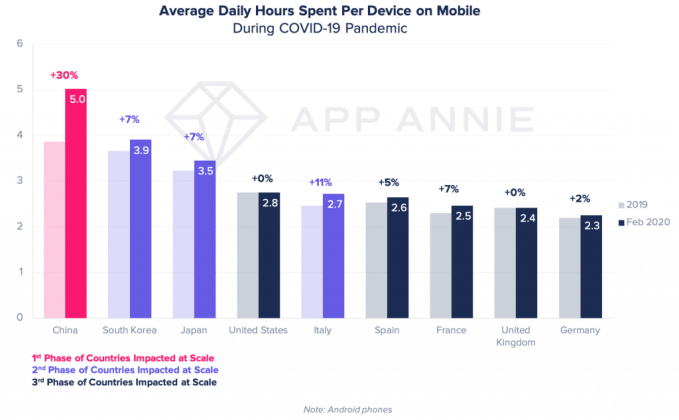
Business and education apps in particular are surging in China. During the first half of February, business and education apps were downloaded at levels roughly 2x the weekly average in 2019. This included apps like HUAWEI CLOUD WeLink, DingTalk and ZOOM Cloud Meetings. (School kids tried to get DingTalk removed by leaving low ratings, but that doesn’t work.)
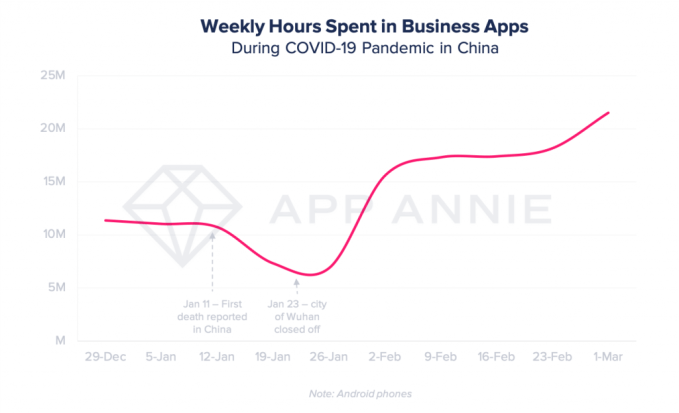
Italy saw something similar. During the first week of March, 761,000 downloads of business apps occurred across iOS and Google Play in Italy — marking the biggest week ever for the category, the firm said. This is up 85% from the week prior (the second-highest week), and up 135% from the average weekly level of the 52 weeks prior.
Zoom’s online meetings app became a No. 1 overall app in 35 markets as of March 16, 2020 as the outbreak spread.
Mobile gaming boomed in China and elsewhere
Another impact from the coronavirus outbreak was a boost in mobile gaming as people are forced to stay home. The trend first kicked off in China, per the same report, with average weekly game downloads in February up 80% compared to the average weekly download for the whole of 2019. And China saw average weekly downloads of 63 million on the iOS App Store. This was up by 25% compared to the average weekly downloads in January 2020.
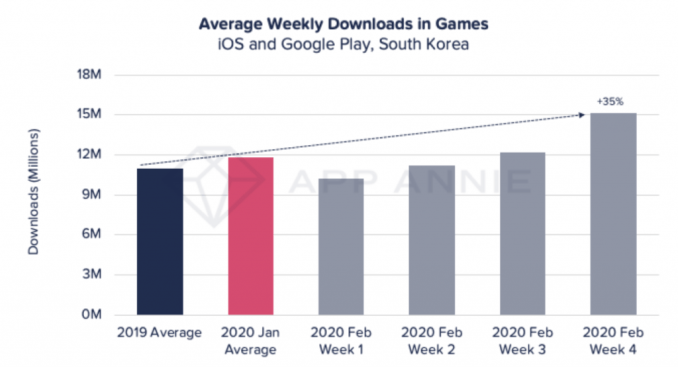
South Korea also saw average weekly game downloads starting on February 23 that were up 35% compared to the 2019 weekly average, exceeding 15 million downloads during that week. That’s up 25% compared to the average weekly downloads in January.
The top 10 games by downloads during the first two weeks of March included Slap Kings, Woodturning, Draw Climber and Brain Test: Tricky Puzzles.
TikTok sees biggest week ever in China
Consumers also turned to social media and video streaming apps to be entertained and keep in touch. Short-form video app TikTok had its biggest week ever in China the week of March 1st. During this time, users spent more than three billion hours in aggregate in the app — up 130% from the weekly average in 2019.
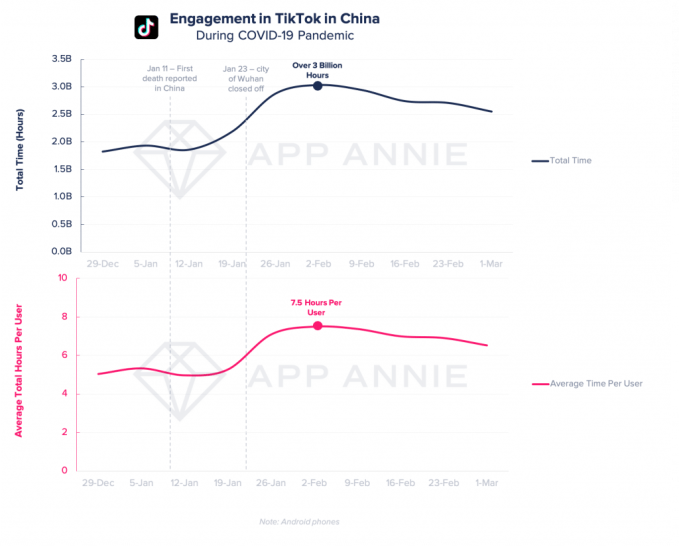
Free streaming app Pluto.tv climbs into U.S. top 10 streaming apps list
Time spent in the top 10 video-streaming apps (as measured on Android phones) has not yet seen a meaningful jump in the U.S. But the types of apps consumers are using may be impacted by the outbreak. As more people stay home, consumers are looking for free streaming options. That could have contributed to both Roku and Pluto.tv’s arrival into the list of the U.S. top 10 video-streaming apps. Roku’s app includes streaming content from its free movies and TV hub, The Roku Channel. Meanwhile, Pluto.tv lets users stream content without a subscription.
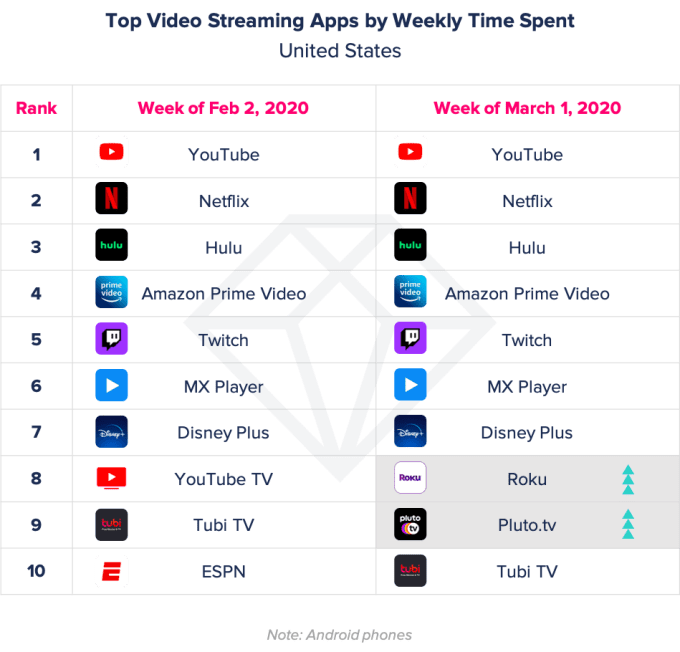
During the week of March 1-7, 2020, App Annie saw time spent in Pluto.tv increase 75% week over week on Android phones in the U.S. — the highest week ever for the app. Time spent during this week was 2.5x the average weekly time spent throughout 2019 and 2020, it also noted.
Ridesharing apps decline more heavily in China and France
The largest impact on downloads of top ridesharing apps appeared in China and France, according to App Annie’s analysis of U.S., U.K., China, Japan, France and South Korea trends. Weekly downloads of China’s Didi fell 75% from the highest week to its lowest week in the period analyzed (January 29, 2019 through March 7, 2020). France saw weekly downloads of BlaBlaCar fall 65% from the highest week to its lowest week in the period analyzed (January 29, 2019 through March 7, 2020). The U.S. and U.K. haven’t yet seen a meaningful decline in Uber downloads, but South Korean app KakaoTaxi and Japanese app Japan Taxi saw declines.
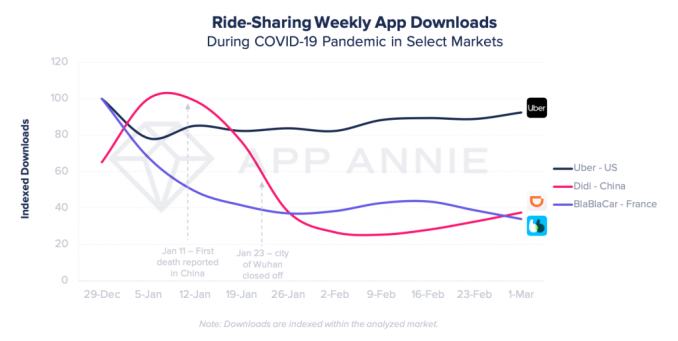
Food delivery apps grew more sharply in U.S., Spain and France
The strongest growth in total sessions in food delivery apps was in the U.S., Spain and France. France saw an uptick during the week of February 16, whereas Spain and the U.S. saw strong growth in total sessions during the week of March 1. China also saw strong growth in weekly time spent in February and the first week of March, but was still down from the beginning of 2020.
App Annie predicts the growth in downloads will climb as more governments impose lockdowns.
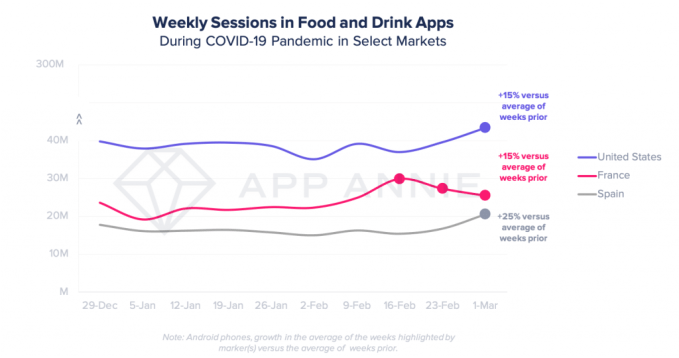
Grocery delivery apps see record downloads
App store analytics firm Apptopia saw more volatility in U.S. food delivery apps but saw grocery delivery apps hitting record levels. Comparing the average daily downloads in February to Sunday, March 15, Instacart, Walmart Grocery and Shipt have seen daily downloads surge by 218%, 160% and 124%, respectively.
Typically, these apps (except for Shipt) see tens of thousands to as many as 20,000+ downloads per day. But on Sunday, Instacart saw more than 38,500 downloads and Walmart Grocery saw nearly 54,000 downloads, the firm says. Shipt, though hitting record numbers, saw only 7,285 downloads on Sunday. (To some extent, its lower figures could be due to Target’s move to integrate Shipt’s grocery delivery service, which it owns, into its main app.)
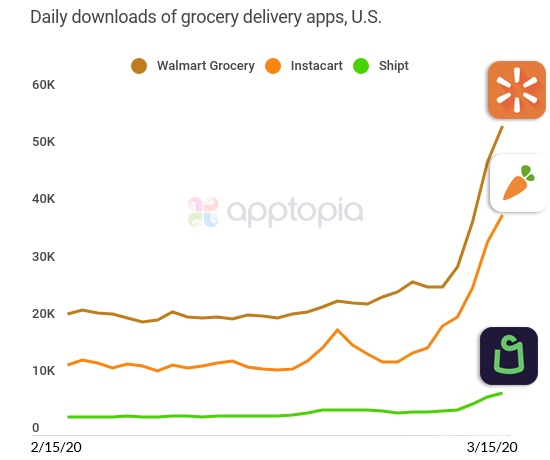
Consumer concern about state of economy prompts fintech app usage
Japan, South Korea, the U.S., and China saw the biggest uptick in time spent during the first week of March, compared to the last week of 2019 at 55%, 35%, 20% and 20% respectively, the report found. Though Robinhood faced numerous outages as the stock market saw significant volatility, the app saw 50% growth across iOS and Android in the first half of March compared with two weeks prior. In Japan, au Pay grew 20% week-over-week in the first week of March. In South Korea, PASS by SK TELECOM grew 20% during that time.
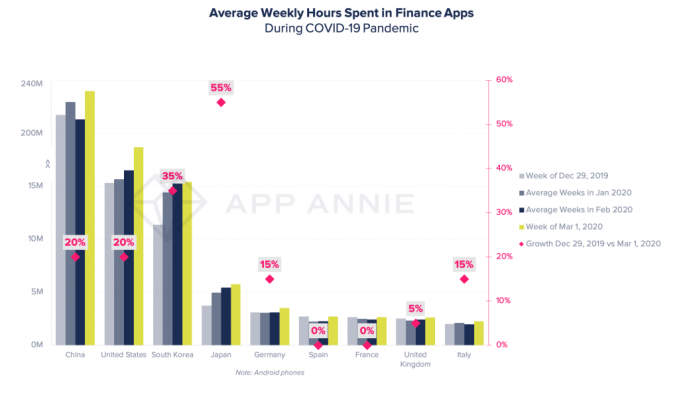
Headspace meditation app grows 90% as consumers look to calm their nerves
Meditation and mindfulness app Headspace saw a 90% increase in time spent on iPhones in the U.S. during the week of March 1st week-over-week, App Annie said.
Other health and fitness apps saw notable increases as well, including the Mayo Clinic app in the U.S, which was up 200% week-over-week on Android, and Chinese exercise app Keep, up 210% in time spent in February.
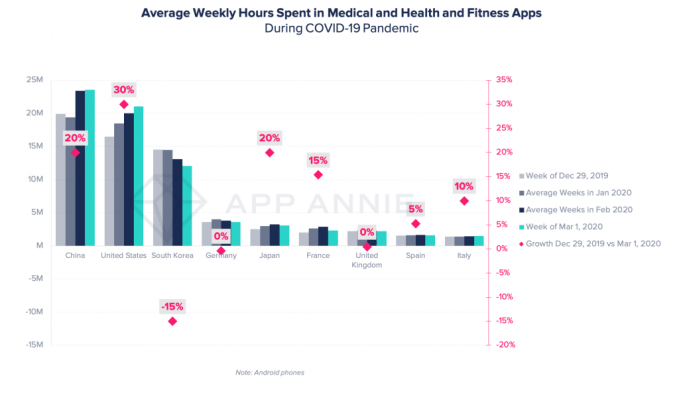
Apps tracking the spread of the coronavirus outbreak
Wired takes a look at apps being used to track the outbreak. In China and South Korea, smartphone apps have been used to monitor people with the disease. But in the U.S., concerns over privacy and data collection could limit this activity. Some suggest that data collection scrubbed of personal details could offer a solution and the impacts could be significant given the severity of the situation. More here.
Headlines
Apple adds lidar to new iPads
Apple introduced this week two new (11 and 12.9-inch) iPad Pro models that are the first to include a lidar scanner — a 3D laser system capable of calculating the distance to objects and other points in the environment. Apple says it will be able to measure objects up to five meters away. The system will have a significant impact on AR apps, which won’t require users to scan their environment first before placing AR objects.
The question now is whether the improvements can bolster the AR industry. Apple has been highly enthusiastic about AR’s potential, but consumer apps are still not that common. Apple has also been slow to bring AR to its own stock apps, and AR startups have struggled, TechCrunch’s Lucas Matney this week reported. AR, then, still feels like a moonshot — and a risky one as the U.S. enters a recession.
iOS 14 leaks
More leaks from the iOS 14 code reported by 9to5Mac indicate we could see updates to Apple Maps, CarPlay and deeper Apple Store integrations in the next version of the mobile OS.
Specifically, iOS 14’s Apple Maps app may include more details about Apple Stores and hardware repair availability, like Genius Bar services available at the store you’re looking up, for example. Also, CarPlay may allow you to set a custom wallpaper, or at least choose from a selection Apple provides that switches between day and night.
Second release of Android 11 developer preview launches
Google this week rolled out the second developer preview of Android 11. Like the first preview, this one isn’t available as an over-the-air update. The preview includes new features like a 5G-state API to see if a user is currently on a 5G network, new APIs for screening robocalls, a new API that can read data from a hinge-angle sensor so that apps can adapt to the angle of the hinge, support for variable refresh rates and more.
Google’s “Go” line of applications for low-end Android phones adds “Camera Go” app
Android Go, the version of Android optimized for low-end Android handsets, now has more than 100 million monthly active users. The company says it’s also releasing a Camera Go app, initially on the Nokia 1.3, in 28 countries, with more devices to follow. The app will allow low-storage devices to take quality photos without depleting up their internal storage. The app is specifically optimized for devices with 1GB of RAM, and won’t support HDR+ or Night Sight. However, it will track how much photo and video storage you have left and help you clear up space.
Average U.S. iPhone user spent $100 on apps in 2019, up 27% YoY
The latest from Sensor Tower indicates in-app purchases and premium downloads are on the rise. U.S. consumers on iPhone spent $100 on apps for the first time in 2019, up from $79 spent in 2018. These figures don’t include money spent on apps like Amazon, Uber and others, where purchases don’t flow through the App Store.
In addition, the report found in-app spending was up 27% year-over-year and mobile games represented nearly 54% of the money spent ($53.80). Other top categories included entertainment, photo & video, music and lifestyle.
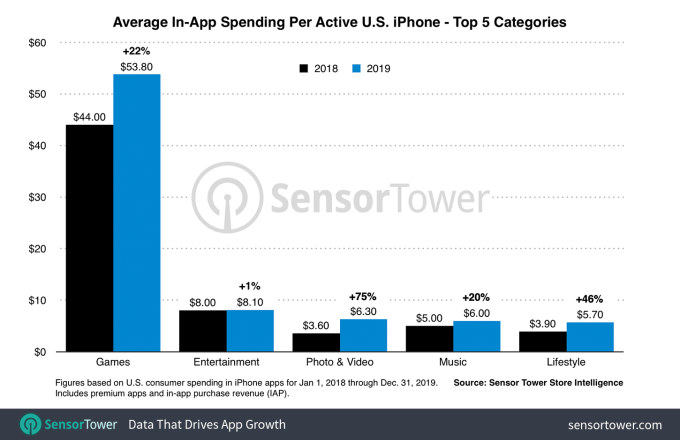
TikTok brings in outside experts to help it create policies
In October, TikTok tapped corporate law firm K&L Gates to advise the company on its moderation policies and other topics affecting social media platforms. As a part of those efforts, TikTok said it would form a new committee of experts to advise the business on topics like child safety, hate speech, misinformation, bullying and other potential problems.
This week, TikTok announced the technology and safety experts who will be the company’s first committee members. The committee chair will be Dawn Nunziato, a professor at George Washington University Law School and co-director of the Global Internet Freedom Project. Others include academic experts and ethicists whose backgrounds are well-versed in the topics TikTok faces. The group will meet with leadership to help TikTok create better policies than the horrible ones it used before. The early focus will be on stemming the spread of misinformation and preventing election interference.
TikTok also this week said it will stop using China-based moderators to screen foreign content.
Google’s Advanced Protection program turns off side-loading apps and more
Google this week expanded the feature set for its Advanced Protection Program, a security offering that helps safeguard Google Accounts of those at risk for targeted attacks — like politicians, journalists, activists, business leaders and others. The program already provides an increased level of protection for these accounts by limiting access to data, blocking fraudulent account access, supporting the use of physical security keys and more.
Now, Google is adding new malware protections to the program, including the automatic force-enabling of Play Protect and blocking side-loaded apps. There are still some ways to get non-Play Store apps on the device, like through other manufacturer app stores or developer tools, however.
Fundings and M&A
- Mobile gaming publisher Scopely, home to titles like Marvel Strike Force, Yahtzee with Buddies, Star Trek Fleet Command and Scrabble Go, raised another $200 million, bringing its total raise to date to $650 million. Investors include Advance (the publishing company for Condé Nast) and The Chernin Group.
- Female-led Robin Games raises $7 million seed for its new “lifestyle gaming” category aimed at women gamers. Company is founded by former Jam City executive Jill Wilson and aims to develop fantasy games that go beyond “warriors and dragons.”
- Fox bought free, ad-supported streaming service Tubi for $440 million. Although available across platforms, the Tubi app is a top 10 streaming mobile app in Q1 2020, according to Apptopia data.
Downloads to help you get through the outbreak
- Scribd: Subscription-based Scribd is making its library of e-books, audiobooks and magazine articles available for free for a month.
- Nextdoor: Social networking app for neighborhoods, Nextdoor, added new Help Maps and Groups features that let users organize and offer assistance to nearby members. On the maps, you can offer what sort of assistance you can provide and when you’re available. Others can check the map to see who can help.
- Headspace (or other meditation apps): Healthcare workers can download Headspace’s meditation app for free during this pandemic. The app is normally $12.99/month. Other popular apps like Simple Habit, Breethe, Shine and others are also rounded up in a new App Store collection.
- Apple’s work from home/stay at home collection: Apple has also rounded up a solid collection of apps for those faced with working and staying at home for the first time. There are apps for studying, working, keeping in touch, exercising, cooking and more — including those you’ve likely heard of (Microsoft Teams, Snapchat, Instacart), and those that may be new to you (Marco Polo, Epic!, Mealime).


